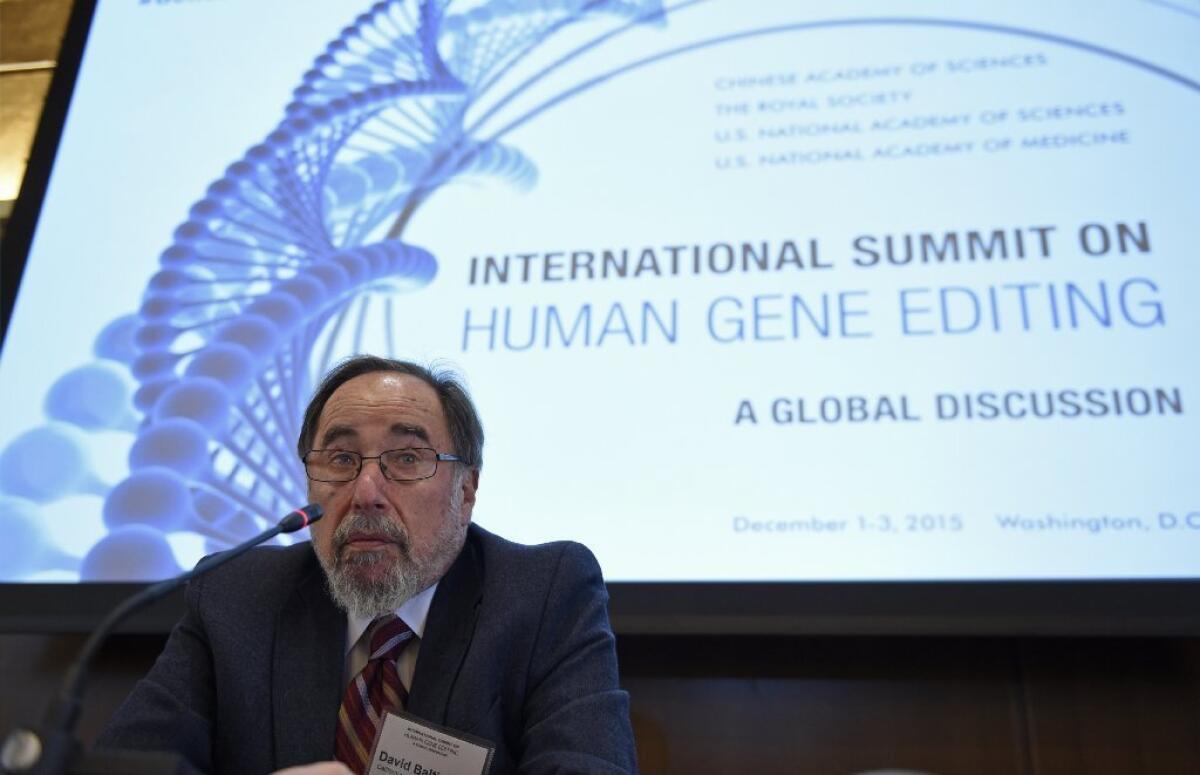International gene editing conference declines to ban eventual use in humans

Nobel laureate David Baltimore of Caltech speaks to reporters at an international summit on the safety and ethics of human gene editing held in Washington.
- Share via
An international conference on gene editing on Thursday left the door open to future use, in humans, of new techniques that alter an organism’s genetic architecture in ways that carry forward to future generations.
With questions of safety, need and ethics still unanswered, the U.S. National Academies of Sciences, Engineering and Medicine; the United Kingdom’s Royal Society; and the Chinese Academy of Science agreed that “it would be irresponsible to proceed with any clinical use of germline editing.”
Issuing a statement on the final day of a three-day colloquy, the gathered scientists did not close the door on the eventual clinical use of such “germline editing,” in which the DNA of eggs, sperm or embryos are altered in ways that would be carried by all of the cells of a resulting child and passed on to subsequent generations as part of the human gene pool.
“As scientific knowledge advances and societal views evolve, the clinical use of germline editing should be revisited on a regular basis,” the panel concluded.
California Institute of Technology biologist David Baltimore, who chaired the proceedings, said the Organizing Committee for the International Summit on Human Gene Editing steered away from using any terms -- including “ban” or “moratorium” -- that would stifle ongoing research on the clinical uses of gene editing short of its use to establish a pregnancy.
“The modification of the germline ... requires a pregnancy to define a germline,” Baltimore said. Short of “experiments involving human embryos,” he said, the forum’s organizing committee believes that “intensive” basic and preclinical research on genetic editing “is needed.” Quoting the organizing committee’s final statement, he said that research “should proceed subject to appropriate legal and ethical rules and oversight.”
That formulation clears the way for use of new gene-editing techniques on adult human cells, potentially creating new therapies to harness the immune system to fight disease and to blunt or reverse the effects of some hereditary diseases.
But it also appears to define the controversial work of a Chinese research team as acceptable.
Last April, a team of Chinese scientists revealed it had used DNA-editing techniques to alter a gene in human embryos. The altered embryos were apparently not incubated with an eye to carrying them though to birth. But the revelation nevertheless set off an urgent debate over the ethics — and wisdom — of tinkering with the most basic building blocks of life.
With the completion of the three-day international forum, Baltimore and other scientists said that debate and deliberation would continue. The U.S. National Academies of Sciences, Engineering and Medicine have appointed a panel, to be chaired by MIT cancer researcher Richard O. Hynes and University of Wisconsin bioethicist Alta Charo, to hold hearings and draft a report by the end of 2016, Baltimore said.
Citing the academic adage that “no committee has done its work until it appoints the next committee,” Baltimore said, “We do feel very strongly this is the right way to go.”
In the meantime, the organizing committee’s statement acknowledged that “each nation ultimately has the authority to regulate activities under its jurisdiction,”
But, it said, “The human genome is shared among all nations. The international community should strive to establish norms concerning acceptable uses of human germline editing and to harmonize regulations, in order to discourage unacceptable activities while advancing human health and welfare.”
Follow me on Twitter @LATMelissaHealy and “like” Los Angeles Times Science & Health on Facebook.
MORE FROM SCIENCE
91% of migratory birds face peril on their journeys, study says
Kepler’s false-positive rate for some planets is higher than thought
Nearly half of Americans with high cholesterol are not taking medication, study says







